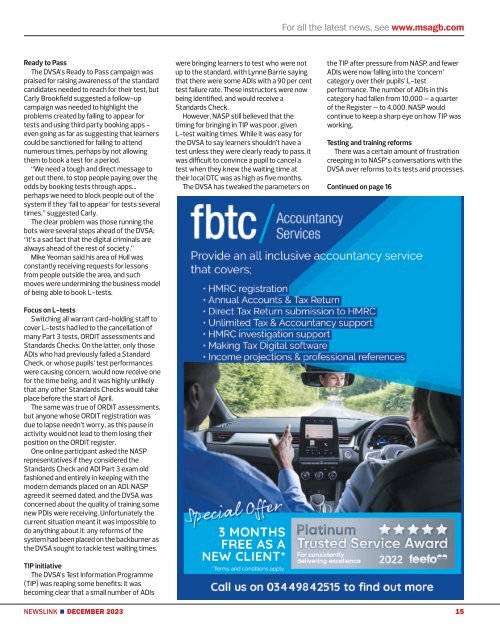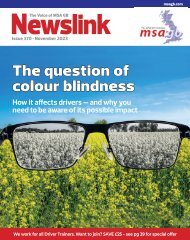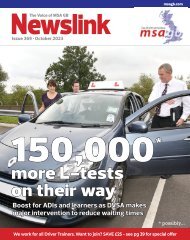Newslink December final
Motor Schools Association members magazine; driver training and testing; road safety
Motor Schools Association members magazine; driver training and testing; road safety
You also want an ePaper? Increase the reach of your titles
YUMPU automatically turns print PDFs into web optimized ePapers that Google loves.
For all the latest news, see www.msagb.com<br />
Ready to Pass<br />
The DVSA’s Ready to Pass campaign was<br />
praised for raising awareness of the standard<br />
candidates needed to reach for their test, but<br />
Carly Brookfield suggested a follow-up<br />
campaign was needed to highlight the<br />
problems created by failing to appear for<br />
tests and using third party booking apps -<br />
even going as far as suggesting that learners<br />
could be sanctioned for failing to attend<br />
numerous times, perhaps by not allowing<br />
them to book a test for a period.<br />
“We need a tough and direct message to<br />
get out there, to stop people paying over the<br />
odds by booking tests through apps...<br />
perhaps we need to block people out of the<br />
system if they ‘fail to appear’ for tests several<br />
times,” suggested Carly.<br />
The clear problem was those running the<br />
bots were several steps ahead of the DVSA;<br />
“it’s a sad fact that the digital criminals are<br />
always ahead of the rest of society.”<br />
Mike Yeoman said his area of Hull was<br />
constantly receiving requests for lessons<br />
from people outside the area, and such<br />
moves were undermining the business model<br />
of being able to book L-tests.<br />
Focus on L-tests<br />
Switching all warrant card-holding staff to<br />
cover L-tests had led to the cancellation of<br />
many Part 3 tests, ORDIT assessments and<br />
Standards Checks. On the latter, only those<br />
ADIs who had previously failed a Standard<br />
Check, or whose pupils’ test performances<br />
were causing concern, would now receive one<br />
for the time being, and it was highly unlikely<br />
that any other Standards Checks would take<br />
place before the start of April.<br />
The same was true of ORDIT assessments,<br />
but anyone whose ORDIT registration was<br />
due to lapse needn’t worry, as this pause in<br />
activity would not lead to them losing their<br />
position on the ORDIT register.<br />
One online participant asked the NASP<br />
representatives if they considered the<br />
Standards Check and ADI Part 3 exam old<br />
fashioned and entirely in keeping with the<br />
modern demands placed on an ADI. NASP<br />
agreed it seemed dated, and the DVSA was<br />
concerned about the quality of training some<br />
new PDIs were receiving. Unfortunately the<br />
current situation meant it was impossible to<br />
do anything about it: any reforms of the<br />
system had been placed on the backburner as<br />
the DVSA sought to tackle test waiting times.<br />
TIP initiative<br />
The DVSA’s Test Information Programme<br />
(TIP) was reaping some benefits: it was<br />
becoming clear that a small number of ADIs<br />
were bringing learners to test who were not<br />
up to the standard, with Lynne Barrie saying<br />
that there were some ADIs with a 90 per cent<br />
test failure rate. These instructors were now<br />
being identified, and would receive a<br />
Standards Check.<br />
However, NASP still believed that the<br />
timing for bringing in TIP was poor, given<br />
L-test waiting times. While it was easy for<br />
the DVSA to say learners shouldn’t have a<br />
test unless they were clearly ready to pass, it<br />
was difficult to convince a pupil to cancel a<br />
test when they knew the waiting time at<br />
their local DTC was as high as five months.<br />
The DVSA has tweaked the parameters on<br />
the TIP after pressure from NASP, and fewer<br />
ADIs were now falling into the ‘concern’<br />
category over their pupils’ L-test<br />
performance. The number of ADIs in this<br />
category had fallen from 10,000 – a quarter<br />
of the Register – to 4,000. NASP would<br />
continue to keep a sharp eye on how TIP was<br />
working.<br />
Testing and training reforms<br />
There was a certain amount of frustration<br />
creeping in to NASP’s conversations with the<br />
DVSA over reforms to its tests and processes.<br />
Continued on page 16<br />
NEWSLINK n DECEMBER 2023 15
















